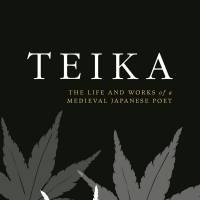Teika lived from 1162 to 1241, and was a highly influential Japanese poet. Paul S. Atkins' new study of his work aims to reintroduce him to a non-native audience and to analyze why his verse had such a large impact on the trajectory of Japanese poetics.
Teika: The Life and Works of a Medieval Japanese Poet, by Paul S. Atkins.
280 pages
UNIVERSITY OF HAWAII PRESS, Nonfiction.
Teika was born into the Heian court elite, so poetry was inextricably linked with his biography and social position. Poetry was integral to court life, as skill with the form was necessary for advancement.
Teika championed a new style of poetry, pejoratively termed "Bodhidharma verse" — essentially gibberish — by his contemporaries. The term comes from an insult used to describe Zen Buddhism, which in the 12th century was considered by mainstream Japanese Buddhism to be too esoteric.
The new style was "highly allusive, and linguistically and conceptually innovative." Revolutions in art are always accompanied by inter-generation clashes, and Atkins' invocation of a dynamic literary scene where artists do battle over the future of their form is vivid and entertaining.
The rest of the book delves into the details of Teika's poetry, analyzing influences from his Japanese predecessors and classical Chinese works, and his influence on poets who came after, while debating the authenticity of certain texts.
These chapters assume a certain familiarity with the material and are clearly aimed at scholars, making the book as a whole less accessible to a wider readership.

















With your current subscription plan you can comment on stories. However, before writing your first comment, please create a display name in the Profile section of your subscriber account page.